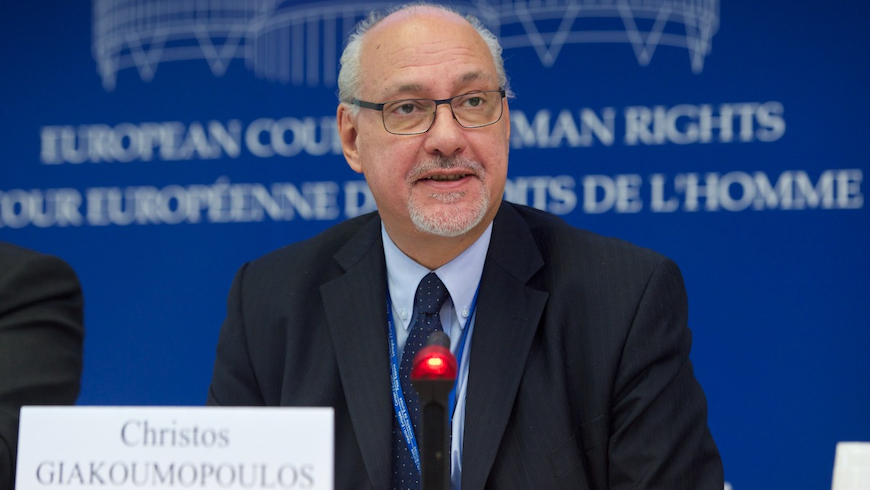Speech by Christos Giakoumopoulos
International Conference on the joint project on "Supporting the individual application to the Constitutional Court in Turkey" - Review and Way Forward for the Individual Application System, Seven Years On
23 September 2019, İstanbul
Mr President of the Constitutional Court,
Presidents and honourable judges,
Ladies and gentlemen,
Dear friends,
It is a real pleasure to see you all gathered today. Some of you have travelled from quite afar: we thank you for your interest and participation. I also convey my special thanks and congratulations to the Constitutional Court of Turkey: today, we are not only celebrating the anniversary of the individual application system. We have also reached a milestone in a fruitful and productive partnership. We have just completed a 3-year long cooperation project, and I wish to thank the European Union for funding these activities.
Ladies and gentlemen,
The individual application has helped protecting the rights of several thousands of people since its creation. Today, as we mark the 7th anniversary of the individual application system in Turkey, we look back at numerous accomplishments, and we rejoice about the long way that the Constitutional Court has gone already.
At the Council of Europe, we are proud to have contributed to this success. I have just seen statistics,[1] and they are rather telling. As of today, the Constitutional Court of Turkey has received over 200.000 applications. The bulk of cases was actually submitted this year and the year before. This is a clear indication of the Court’s good reputation and success. It also reflects the hopes that Turkish citizens are placing in this institution.
And rightly so. Indeed, there is no important function, no noble purpose like delivering justice, without a great deal of responsibility. For the Constitutional Court, the bar is set very high. And it takes courage, determination, and perhaps some form of audacity, to be a court of last resort. We expect no less from this Constitutional Court, which has already proven its resilience in the most difficult times.
Yet, no man is an island. And this Court cannot do it all alone. The individual application may be a special remedy, it remains nonetheless embedded in a system. So much that it sometimes becomes symptomatic of society’s ills. In a sense, looking at individual applications is like feeling the pulse of society. Any weakness in the justice system will likely be felt by a Constitutional Court. And this is how it should be.
Ladies and gentlemen,
There are two particular points calling for attention today. First, the issue of the execution of Constitutional Court judgements. Second, the scope, the conclusions that should be drawn from Constitutional Court decisions, or as we say in our legal jargon, the so-called erga omnes effect.
As any Constitutional Court operating in a democracy, this institution deals with cases that are delicate in nature. For instance, the Constitutional Court needs to ensure an adequate distribution of powers in practice, appropriate and efficient checks and balances. It needs to ensure that the executive does not overstep its powers interfering with the judiciary or the legislator. It needs to ensure that the legislator respects the Constitution and international law binding the State, and interpret the Constitution and the law in a way that does not create unnecessary international responsibility for the State concerned. It also needs to ensure that constitutional rights and human rights as enshrined in international law be respected by all, including by the judiciary; this is particularly delicate as regards the proportionality of the limitations imposed by judgments of regular courts to fundamental rights and freedoms such as the freedom of expression, freedom of information, freedom of religion or belief, respect for everyone’s private and family life and others. It needs to ensure that people are not prosecuted, that they are not arrested or convicted because of their opinions, even when these opinions are shocking or disturbing for the society, even when they are contrary or hurt the views and feelings of the majority.
Inevitably therefore, the judgments of the Constitutional Court may not please everyone. They point at issues that are sensitive, and sometimes downright controversial when it comes to their enforcement. But we all know that the constitutional logic must prevail.
The Constitutional Court exemplifies a certain order, the constitutional domain, which is a different from the rest of the judiciary. However, one must understand the system’s logic. The Constitutional Court is a court of last resort, and for this mechanism to function properly, in an efficient way, Constitutional Court judgements should apply to other courts.
Instances where Constitutional Court judgements are challenged or left unexecuted are weakening the legal order. In fact, they are detrimental to any judge, because ultimately, these events are sapping, undermining judicial authority and legitimacy. The European Court of Human Rights rightly observed that an effective system is necessarily a harmonious one. Harmony is at the heart of efficiency.
Strengthening existing tools to ensure the execution of Constitutional Court judgements will always be useful. One should also consider developing a comprehensive mechanism for this purpose. In many countries, constitutional courts are normally vested with the power of overruling judgments or decisions causing violations, so that their effective execution is not a difficult issue. However, in Turkey, the Constitutional Court does not have such prerogative. So, a monitoring mechanism at the level of, or within, the Constitutional Court to make sure that appropriate follow-up is given to its judgments, thus preserving the indispensable coherence of the constitutional order, may be advisable.
A second issue to consider is the so-called erga omnes effect of Constitutional Court rulings. There are some features of the individual application system which have been read in the sense of confining the judgments of the Constitutional Court to very limiting circumstances of one specific case, i.e. restraining the effect of particular cases. If this held true, the individual application system would have rather limited added value. And the Constitutional Court judges would be doomed as Sisyphus, attending to each file without fulfilling the multiplier role that they should have.
Ladies and gentlemen,
In order to render justice, it is sometimes necessary to consider the essence of cases encountered, and draw general conclusions. In some occasions, when national legislation may be at the source of violations, this might imply working upstream, with the legislator or the executive branch.
The issue of maiden names is a case in point. The European Court of Human Rights and the Constitutional Court have already ruled that married women should be able to retain their maiden name if they so wish, but, for the time being, necessary changes have not yet been effected in law.
Ladies and gentlemen,
Within the judiciary, our projects show that much can be achieved through dialogue. In the past three years, we created opportunities for discussion at multiple levels:
- through case law fora, involving the Court of Cassation and the Council of State;
- through roundtables with the newly established Courts of Appeals;
- and eventually through activities that have raised awareness of first instance judges and prosecutors to human rights standards and existing case-law.
We have witnessed first-hand how such dialogue contributed to mutual understanding in various fields. The feedback that we have received is that there is a need to create more of such opportunities at every level. I am very pleased that we can already foresee a continuation of our cooperation in the coming years.
I also wish to use this opportunity to thank everybody here who has worked hard to make the SIAC project a success, in particular national trainers who, together, have delivered training on human rights and the individual application system to 6,000 judges, prosecutors and lawyers across Turkey.
Ladies and gentlemen,
We have a dense programme before us, with many speakers from various backgrounds. This should be a chance to look at the individual application system from different perspectives, and I hope that you will find this interesting and beneficial.
Let’s not lose sight of the aims that we are working for as judges, lawyers, or members of the international community – which is respect for human rights. Because it is precisely this strong belief in human rights that makes us European, that allows a meaningful dialogue on the basis of common values, that ensures stability, peace and prosperity for everyone in our 47 Member States.
I wish you great success, and thank you for your attention.




